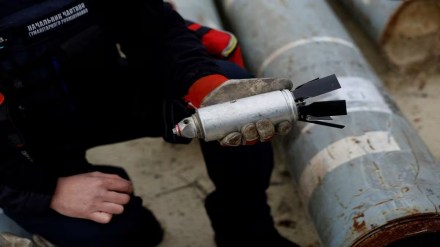The recent announcement by the Biden Administration to provide Ukraine with an $800 million security assistance package highlights the ongoing support for the country amidst the Russia-Ukraine conflict. This move marks the 42nd Presidential drawdown package under the Biden Administration, reflecting a total commitment of over $41.3 billion in military assistance since the conflict began. While the package includes crucial supplies that can strengthen Ukraine’s defense capabilities, the inclusion of controversial Dual-Purpose Improved Conventional Munitions (DPICM), also known as cluster munitions, raises concerns due to their significant impact on civilian populations and the environment.
Cluster Munitions: A Controversial Weapon:
According to information in the public domain, Cluster munitions, such as the Dual-Purpose Improved Conventional Munitions (DPICM), consist of multiple smaller explosive sub-munitions or bomblets. When deployed, these sub-munitions disperse over a wide area, posing a significant threat to military targets and civilian populations alike. The use of cluster munitions has been a subject of global concern, leading to a convention that bans them, supported by 111 state parties. The inclusion of cluster munitions in the assistance package to Ukraine marks a departure from the United States’ previous stance against their use.
Impact and Concerns:
The impact of cluster munitions on the ongoing Russia-Ukraine war would heavily depend on their specific use and the areas targeted. However, their indiscriminate nature raises significant concerns. Cluster munitions have the potential to cause extensive collateral damage, harm civilians, and create long-lasting dangers even after conflicts end. Deploying these weapons in populated areas increases the risk of civilian casualties, destruction of vital infrastructure, and the contamination of land with unexploded ordnance. The presence of unexploded bomblets can continue to pose a threat to civilians, hindering post-conflict recovery and reconstruction efforts.
Controversy and the Way Forward:
The inclusion of cluster munitions in the assistance package to Ukraine has sparked controversy due to their well-documented humanitarian and environmental impact. Critics argue that their use undermines international norms and risks exacerbating the human toll of the conflict. As the situation evolves, it is essential for the Biden Administration to consider the potential consequences of such weapons and explore alternative means to ensure Ukraine’s security. Emphasizing diplomatic efforts, supporting humanitarian initiatives, and investing in conflict resolution strategies can contribute to a safer and more sustainable path forward, reducing the reliance on weapons that pose significant risks to civilians and the environment.
View of a War Correspondent
While the Biden Administration’s commitment of $800 million in security assistance to Ukraine demonstrates ongoing support, it is crucial to carefully weigh the potential humanitarian and environmental impact of these weapons and explore alternative approaches that prioritize civilian protection and sustainable conflict resolution.
Neeraj Rajput, a Senior War-journalist having more than two decades of multimedia experience with specialization in defense, conflict, security, strategic affairs & geopolitics, says: “Ukraine forces armed with western tanks and ammunition have not received much success in counter-offensive against Russian armed forces. It is seen as a major setback for the US and other allies.”
“This could be a big reason that Biden has agreed to supply cluster bombs to Ukraine for fresh offences mainly against Russian holds (trenches etc) along Donbas region,” Rajput author of Russia-Ukraine war, ‘Operation Z Live’ in Hindi adds.
